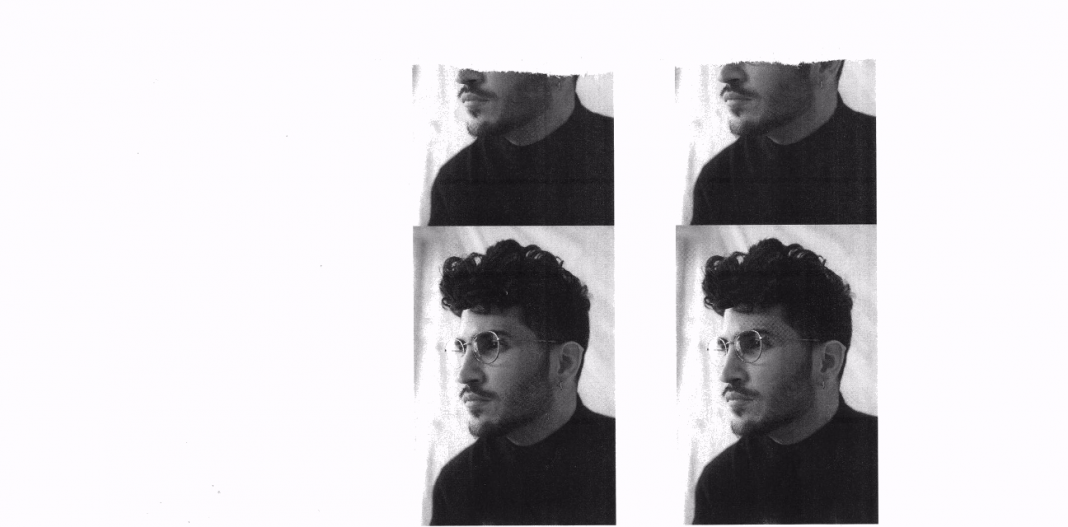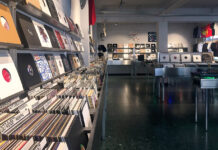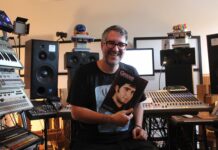Photo: Press (Danny Daze)
Legend has it that as a kid, Danny Daze begged his mother to buy him a couple of turntables. She reluctantly gave in, but only under the condition that the young teen would pay her back the $2000 she spent. He did, and faster than either of them would have suspected at that, with money earned from DJing at parties in his native Miami. A few years later, Daze established himself internationally and besides DJing and releasing records on various label, founded his own imprint Omnidisc in 2015. Claiming that Electro is the foundation of the Omnidisc sound, his contribution to our Groove podcast comprises strictly Electro bangers. Daze, who will return to Kompakt’s Speicher series with a collaborative EP with Omnidisc youngster Shokh at the end of July, clearly hasn’t forgotten about his roots.
When and how did you first hear about Electro?
Back when I was born in the 80s, Electro was absolutely everywhere in Miami without me knowing it was called Electro. My dad would put on our local radio station, Power 96, where you would hear everything from Egyptian Lover to Juan Atkins to Two Live Crew who sampled classic Kraftwerk records and rapped the dirtiest lyrics possible over them.
You’ve started out DJing in your native Florida as a young teenager, playing mostly Electro. What were key records for you back in those days?
I bought my first turntables in 1999, back when Florida Funky Breaks were still pretty big. Acts like DJ Icey, Baby Anne and Rick West ruled the club circuit. For some reason though, I always gravitated to when I heard other DJs play really dark broken beat stuff which I learned to be called „Electro“. There are a couple records that really stand out when it comes to my early years in DJing. The first one being Anthony Rother’s Sex With The Machines. I still remember the day I found this record and listened to the track „Basic Level“ which turned me into the darker side of anything „broken beat“. Another record would have to be the Tone Capsule album by Miami natives, Soul Oddity aka Phoenecia. Until this day, this album still plays in my car and is a crucial reason why I started DJing and making music. If there has to be another record I have to add onto this list it has to be a 1999 release by Perspects called Desire & Efficiency. I had never heard the mixture of Electro and melodic storytelling like the way this track did.
Countless Electro heroes from Egyptian Lover to DJ Stingray and Drexciya have become increasingly popular again while young producers are picking up the style as well. How would you explain the Electro revival?
I’ve always felt revivals come and go with the amount of over exposure or over saturation of something. I think the combination of the really slow House thing becoming popular for a couple years has catered to the complete opposite of a counterculture who wants to hear something different. There’s no doubt about it, Electro makes your ass shake and I’m happy there are asses shaking again. (laughs)
With its backbeats and fast-paced rhythms, Electro can be quite difficult to mix. What makes a great Electro DJ?
There are quite a few DJs I looked up to back in the day when I was a 13 year old. Guys like DJ Godfather, Uprokk, Exzakt, Wreck and even the artist who sometimes produce or simply toss a couple electro records into their DJ sets like The Advent, Cari Lekebusch or Miss Djax. The one thing that drew me to Electro DJing was how fast paced it is, not only the tempo of the music but how quick you actually mix the records in and out. Sometimes mixing two songs together for too much time would actually ruin the vibe you had going. I’ve always felt Electro is best played like when playing Hip-Hop, where all of a sudden a brand new bassline or beat comes in out of nowhere. It’s very closely attached to the way D’n’B and Jungle DJs play as well. Of course, music selection and timing of the records being played comes into play as well.
For your contribution to our Groove podcast, you have put together a slew of tracks that have shaped your taste in sound. How did you select the records?
This mix gave me the perfect opportunity to go back into my warehouse and dig through my record collection. Unfortunately, I don’t have space in my house for them so I went to the warehouse and went through some of my favorite records that remind me of when I started playing. I wanted to how the broad spectrum of influences I’ve had over the years with this mix while still keeping it cohesive.
You have also said that the sound represented in the mix has influenced your own Omnidisc label. Could you elaborate on this?
Electro is the foundation of Omnidisc. Even if it’s a 4 on the floor beat, the Electro foundation is always in the personality of a track. So this mix not only represents the aggressiveness that goes on inside the Omnidisc catalog but also touches upon some of the more melancholic influences that go on in the label. Something that would stem out of the production of an act like MAS 2008 for example.
Besides releasing music from well-known producers like DJ Tennis, you have also put out records by underground favorites like Drvg Cvltvre and, recently, a rather unknown producer called Shokh. How do you find the music that you release through Omnidisc and what does a record have to offer so that you’ll consider it for release?
I’ve always been a big fan of things happening organically. If you go out and search for music, odds are it will take you a lot longer than releasing something that you like and having future releases organically land on your lap. Mostly all the music that we release is somehow tied to each other. Whether it’s a friend handing it to a friend who released on the label, or someone simply giving me a USB stick right before I get up to a gig. I’m into a wide spectrum of sound, so for this reason, we have two sublabels under Omnidisc. We have the Polyester Series which is where DJ Tennis released his release and focus on a much rougher New Wave/Electro influence and then we have the Swim Series, which is where guys like Dimitri Veimar have released which focus on a much more melancholic approach to sound that’s still made for the dancefloor. Someone like Drvg Cvltvre for example is an artist I released in 2005 on my first record label called Omniamm. He was released under the name RA-X at the time. I simply sent him an email a few years ago and told him „……… I’m baaaaack!!!!!! Let’s go!!“ There are way too many record labels out there at the moment so for a label to really stand out, the music truly has to feel unique. With every release, I’ve always said one thing. „The song needs to be one of those songs that you remember when you walk out the door“. I pay for the vinyl pressing myself, so this is a good filter on whether or not I feel strongly about the music we’re releasing.
Last but not least: Where can we see you behind the decks in the near future and what are your plans as a producer and label owner?
I’ll be in Europe all summer so I’m really hoping I get to meet some people who tuned into this mix and read our interview. Resident Advisor is always a good way to keep up with the shows as to where I’ll be playing. As for Omnidisc, we’ve got quite a few releases coming up by guys like Anshaw Black who’s also my partner on the label. Anthony Rother, A Credible Eye Witness, Chinaski and Dimitry Distant have releases soon to come as well. As far as my own stuff goes, Shokh and I have a release coming out on Speicher in July along with a remix on Hippie Dance in June. I’ll also have a remix for Depeche Mode coming out this year as well. My main focus lately has been production on my first album which will come out next year, so putting quite a bit of time into that this year.
Stream: Danny Daze – Groove Podcast 110
No track list available.





